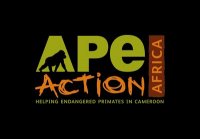 | |
| Founded | 1996 |
|---|---|
| Type | Non-profit Foundation organization |
| Focus | Environmentalism, conservation |
| Location | |
Area served | Cameroon |
Key people |
|
| Website | apeactionafrica.org |

Ape Action Africa is a non-profit NGO founded in 1996 dedicated to the conservation of endangered gorillas and chimpanzees, threatened by the bushmeat trade in Central and West Africa. Ape Action Africa manages the rescue and rehabilitation of Great apes across much of Cameroon, with a large sanctuary in the Mefou forest. Some of these Apes include the Western gorilla, Western lowland gorilla, Cross River gorilla, and the Nigeria-Cameroon chimpanzee. With more than 300 primates in its care, Ape Action Africa is now one of the largest conservation projects of its kind in Africa. [1] Many of the animals arrive at the sanctuary as orphans, mainly due to the illegal bushmeat trade, which has grown in recent years as a result of deforestation of the Cameroonian jungle.
Contents
At the frontline of the organisation is Rachel Hogan, originally from Birmingham, who now lives full-time in the jungle.
Ape Action Africa is featured in the 2006 TV series Going Ape. [2]
On 22 November 2010, one of the founding directors of Ape Action Africa, Avi Sivan, died in a helicopter crash while travelling between the cities of Douala and Yaoundé in Cameroon. [3] [4] [5]
On 24 December 2010, the board of trustees of the charity announced Rachel Hogan as the new Director and Bibila Tafon (Babs) as the new Manager of the Mefou National Park.
On 24 April 2014, the Dublin premiere of the film Tarzan was in aid of Ape Action Africa, supported by the lead, Kellan Lutz, who is himself interested in conservation. [6]
